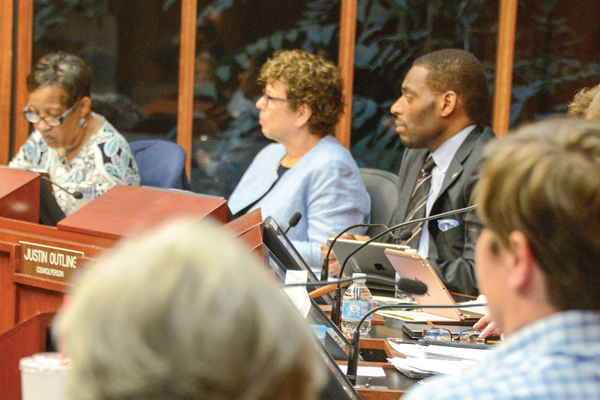The Greensboro City Council opened its small group meetings or mini-work sessions to the public and held its first mini work session on Tuesday, April 10. The meeting was to discuss boards and commissions appointed by the City Council, about as mundane a topic as imaginable.
With all that is going on in Greensboro right now, spending one of its rare work sessions on boards and commissions is an odd choice. Both parking deck projects much ballyhooed by the City Council as moving the downtown forward are in limbo. There is no signed contract to begin work on either deck, both of which are being built by private developers and have a lot of items that have to be negotiated. The February One Place Westin Hotel deck is tied up in court right now, but, without a signed contract with the developer, construction couldn’t start even if the lawsuit were settled today. The Eugene Street and Bellemeade Street deck doesn’t have a lawsuit holding it up, but the city has not reached an agreement with the developer, The Carroll Companies, which also owns this newspaper.
Mayor Nancy Vaughan said that the council had some issues with appointments to boards and commissions and it was time to straighten everything out.
In fact, although next month the City Council will have to get started on its budget, a second meeting on boards and commissions is set for Tuesday, April 24. Vaughan said that she expected it would take several more meetings to get everything on boards and commissions in shipshape.
City Councilmembers Sharon Hightower, Marikay Abuzuaiter, Tammi Thurm, Nancy Hoffmann and Justin Outling all attended at least a portion of the meeting.
The meeting was well staffed with interim City Manager David Parrish, Assistant City Managers Barbara Harris and Chris Wilson, City Attorney Tom Carruthers and Assistant City Attorney Jennifer Schneier.
In the past, appointments to boards and commissions were done in a fairly haphazard fashion. It didn’t seem to be a high priority on anybody’s agenda and the district where the appointee lived didn’t matter much to the City Council. If someone wanted to serve, they were generally appointed. But then, the boards that could be expanded to nine members were and each councilmember had one appointment, and the district councilmembers became very concerned with making certain their district is represented on each board and commission.
Vaughan said that one problem she wanted to fix was that when people graduate from City Academy they are automatically put in the data bank for potential appointees but are rarely appointed to any board or commission because councilmembers don’t necessarily know them and don’t think about appointing them.
She also said that people who complete Other Voices should be put in the data bank.
In a memo sent out after the meeting, Vaughan said, “The goal of our boards and commissions is to get as many people as engaged with the City as possible with an eye on diversity and inclusivity throughout the city.”
One problem is the hierarchy of the boards and commissions. Probably the two best well known are the Zoning Commission and the Parks and Recreation Commission because their meetings are televised and both have real jobs.
Arguably the most powerful board is the Board of Adjustment. Decisions made by the Board of Adjustment can only be appealed to Superior Court, which means not many are appealed. The Board of Adjustment is kept busy granting variances to the often counter-intuitive and sometimes ridiculous zoning regulations. The City Council could take a look at what keeps coming before the Board of Adjustment and revise the zoning ordinance so it would be more in line with the actual practice of the city. The Minimum Housing Standards Commission can order that houses be repaired or demolished, so it has some clout. The Historic Preservation Commission makes determinations for historic districts. But then you have the Commission on the Status of Women, which hasn’t done much of anything in years. In fact, in a city with eight women on the nine-member City Council – including a woman as mayor – does the city really need a commission on the status of women? The status looks pretty good.
If the goal is to make people feel engaged with the city, it may do that, but what is it actually supposed to do. Nobody seems to know.
There are a number of boards like the Piedmont Triad Airport Authority and the Piedmont Triad Regional Water Authority where the City Council only appoints some of the members, and those boards didn’t seem to be much of an issue. Mainly the councilmembers talked about boards and commissions where all the members were appointed by the City Council and considered issues such as whether someone had to be in the data bank before being appointed or not. The City Council had tried simply appointing people and had to remove several because they didn’t meet the qualifications to be on the board. The data bank gives the city the opportunity to check out the information of the potential appointee and make sure it is accurate. Some people think they live in Greensboro because they have a Greensboro address, but they actually life outside the city and are not eligible to be appointed to a city board or commission, no matter how much they like Greensboro.
As one could expect on a meeting on boards and commissions, the councilmembers spent a good bit of time in the weeds. Abuzuaiter and Thurm had difficulty understanding the fact that the state allowing people to serve on two committees didn’t mean that the state required the city to appoint people to two committees.
Carruthers tried several different explanations but Abuzuaiter was never satisfied that the city wouldn’t be sued for not appointing someone to a committee.

